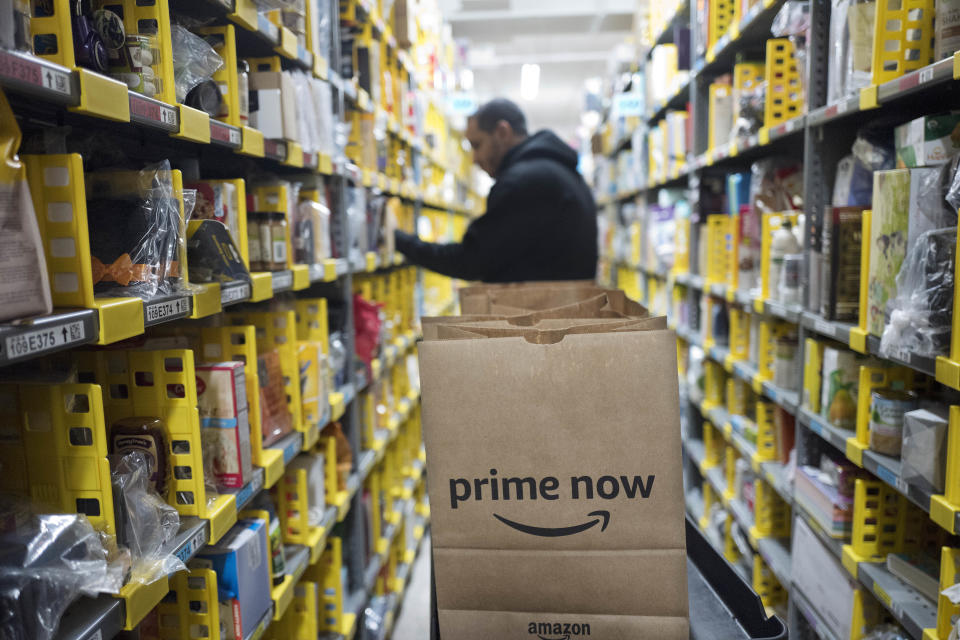It’s folly to break up Amazon, Apple and Google
There’s now bipartisan interest in breaking up tech giants Amazon, Apple, Facebook and Google. Antitrust regulators in the Republican Trump administration are considering action, while House Democrats plan to investigate the matter themselves. Democratic Sen. Elizabeth Warren, who’s running for president, has her own plan to carve up Big Tech.
There’s a fatal flaw with the whole idea. Crusades against omnipotent monopolies succeed when they’re backed by public outrage. With the possible exception of Facebook, the tech giants are popular with consumers. None is a traditional monopoly, and much of what they offer is free. Public ire, if there is any, could boomerang off the companies themselves and lacerate the regulators and politicians who want to hack them down to size.
‘Most-loved’ brands
These four companies are not the same, and it’s important to elucidate how they differ. Online retailer Amazon (AMZN) and search giant Google (GOOGL), for example, are extremely popular with consumers, which makes them very odd breakup targets. In Morning Consult’s 2019 list of the most-loved brands, Amazon ranked first, with Google second. Google subsidiary YouTube ranked 14th, ahead of Disney. Consumers aren’t stupid, and if they truly love these companies, what public interest is served by breaking them up?

Apple (AAPL) is perhaps the world’s most valuable brand, but that’s not the same thing as most popular. Polling firm YouGov rates Apple the eighth most popular consumer-electronics brand, with Samsung and Sony at the top. Sixty-four percent of consumers have a positive impression of Apple, with 15% having a negative impression. Is there a problem here? Not really. Apple smartphones have about 47% market share in the United States, but Google’s Android system has about 52%—and that’s not even the part of Google antitrust officials care about. Consumers can buy any phone they want, and switch with relatively little hassle.
Facebook (FB) is a different story. The social-media giant played an active, if unwitting, role in Russia’s 2016 election interference. It violated its own principles for collecting user data in the Cambridge Analytica scandal, and may have a more ravenous appetite for consumer data than any company in existence. Facebook is not a most-loved brand, and instead shows up on some lists of most-hated companies.
Carving Facebook up
But would a government-ordered breakup accomplish anything? My colleague Andy Serwer, Yahoo Finance’s editor-in-chief, thinks so. He argues that Facebook has been so disingenuous about its business practices, for so long, that it should be the top target for regulators taking on Big Tech.
But a breakup certainly wouldn’t make Facebook cheaper for consumers, since the service is already free. The basic idea seems to be carving off Instagram and WhatsApp, which Facebook owns, to serve as competing social-media networks. But the three services are different and one is not a natural substitute for the other. Besides, Facebook users can ditch the service with virtually no effort—or just stop using it—and they don’t seem to be doing that. In Facebook’s latest quarterly results, the number of American users remained steady and revenue rose.
It makes sense to break up companies when they have near-monopoly market share, they provide poor or overpriced service, and they have the power to bully or eliminate potential competitors. The landmark breakup of AT&T in the early 1980s—which took eight years—came after the telecom giant effectively kept competitors out of the long-distance market, prompting a government lawsuit. The breakup led to lower prices and better service.

Would breaking up any of tech’s Big Four yield similar results? Doubtful. There’s already plenty of price competition in the affected industries. Apple’s smartphones are expensive, premium products, but anybody can buy an Android phone for considerably less. Amazon probably helps lower prices through aggressive competition with retailers such as Walmart, Target and Home Depot. And Amazon has undoubtedly led to improved service industrywide by originating short-term delivery and forcing competitors to keep up.
There are other solutions to legitimate problems besides breaking companies up—such as passing laws regulating their behavior. If American consumers cared about online privacy the way Europeans do, Congress could pass sweeping privacy legislation similar to the GDPR law that went into effect in Europe last year. And to combat fake news on social media, Congress could alter or repeal the part of the 1995 Communications Decency Act that absolves web platforms of liability for defamatory or false content posted by third parties. If Facebook, Twitter, et. al. became liable for every racist post or phony video on their platforms, they’d become cleaner than a church hymnal overnight. No breakup required.
Confidential tip line: rickjnewman@yahoo.com. Encrypted communication available. Click here to get Rick’s stories by email.
Read more:
Trump has no choice but to land a trade deal with China
Your paltry savings from the Trump tax cuts
Why Medicare for all is doomed
Where Obama beats Trump on the economy
How Trump is blowing it with voters
Rick Newman is the author of four books, including “Rebounders: How Winners Pivot from Setback to Success.” Follow him on Twitter: @rickjnewman
Read the latest financial and business news from Yahoo Finance
